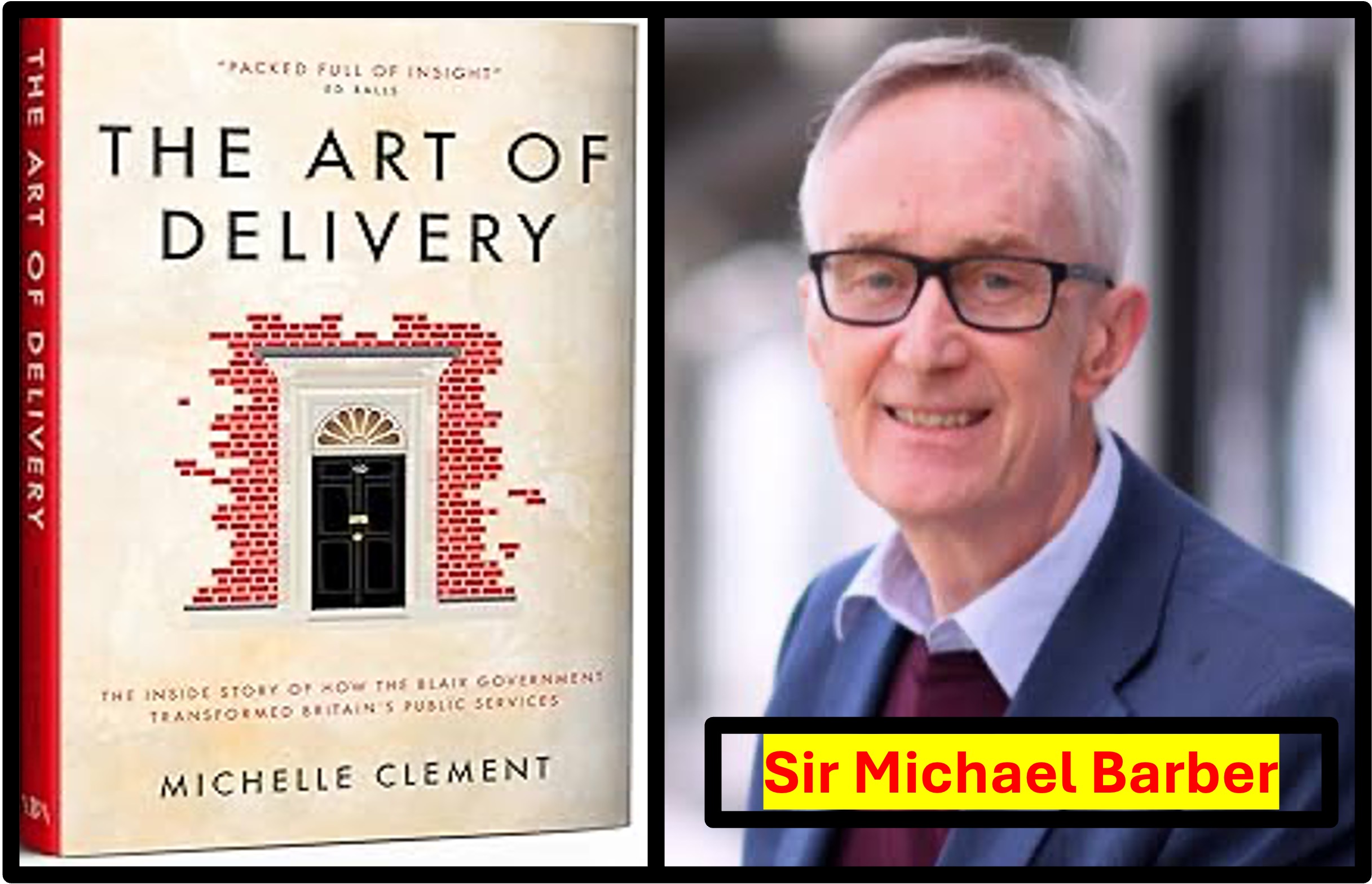This is Blog no 107
Between 2002 and 2005, Sir Michael was Head of the Prime Minister’s Delivery Unit (PMDU) in Tony Blair’s second administration. He acquired an enviable reputation and is credited with masterminding the reform of public services with the emphasis on ‘delivery’.
Now, twenty years later, another Labour Government has invited him to reprise the role.

This Blog draws upon my reading Michelle Clements’ comprehensive account of that period, now subject to revisionist accolades by many Labour Party supporters and heavily based on Sir Michael’s exhaustive and hitherto unpublished diaries. For connoisseurs of public administration and the dynamics of Whitehall, it is another great contribution to our understanding. (See also The Mind of the Minister by Tom Brown, reviewed in the Jan 2025 Catch-up)
The Art of Delivery tells the chronological story of the PMDU from its inception by a Prime Minister frustrated by failure in his first term to improve public service outcomes. It traces its progress alongside momentous political distractions such as the Iraqi war, the 2005 General Election and the start of the Gordon Brown premiership … and thence to its eventual disappearance when the Coalition Government arrived in 2010.
Its perceived success was to galvanise the Departments of Health, Education, Transport and the Home Office to focus on key targets and to work well with the Treasury – which at other times would have strangled at birth, any attempt to muscle in on its ‘performance management’ territory. Clements attributes this largely to Barber’s brilliance; he comes across as a largely flawless paragon of managerial virtue… but then they were his diaries! And those who were interviewed for the book (Blunkett, Darling, Milburn especially) were all enthusiastic admirers! Had she interviewed more political opponents, it might have made for a more balanced narrative, but I imagine the overall thrust of the argument would be about the same. Generally, it seems to have been that rarity in politics – an initiative that worked!
In fact, however, his legacy is less straightforward than it seems. Yes, most experts on public services concede that this was a period of substantial improvements in many areas. That it was an economically benign period should not detract from this as he is rightly credited with cutting through departmental silos and driving controversial policies like ‘choice’ for NHS patients towards their implementation. He was also a tremendous asset for a Government keen to address the ‘perception gap’ when public reaction to operational improvements lagged behind the actualité.
At the time, however, the persistent complaint was that there were ‘too many targets’, many of which arose from the Treasury’s micromanagement through Public Service Agreements. Indeed, Barber’s biggest contribution maybe was to reduce them. Even so, they represented the classic top-down, big-stick pressure on civil servants and others to use their initiatives and deliver the numbers demanded by those at the top.
Targets are not new. Management by Objectives was first promoted by Peter Drucker in 1954, and generations of Managers were schooled to seek SMART (Specific, Measurable, Assignable, Realistic and Timed) targets. Its weakness was to assume the bosses knew best and took little account of what became known as a ‘whole-system’ approach. This is where political targets frequently fall down, for changes to the political context can make a sensible target foolish in a twinkling of an eye. And vice-versa. “Events, dear boy”, as Macmillian is supposed to have said!
The other disadvantage is that by heavily promoting some priorities, other important functions become neglected, and the well-known perverse incentives problem arises. Human ingenuity rarely excels more than when officials find creative ways to ‘game’ the system, or magically reach ambitious numbers with wholly unintended consequences.
I found two interesting omissions in The Art of Delivery. One was the few references to targets that needed revision, back-phasing, recalibrating or just withdrawn to reflect changes elsewhere. There must have been many - but few instances are quoted in the book. The other is the almost complete disregard of consultation. Politicians appear to have dreamt up the targets they wanted to achieve; yet nowhere in this story does there seem to have been a consultation to establish whether they were the best or most appropriate targets. Dialogue seemed mostly confined to inter- or intra-departmental conversations. If external stakeholders were significantly involved, it seems to have been well below the radar.
These days, evidence is clear that making changes needs the active commitment and support of those whose lives or behaviour is most affected. Progressive Managers will, by reflex, turn to key stakeholders and seek their help. Increasingly, they will use co-production to reach a consensus on realistic targets. Back in 2002, neither term was in common use!
This time, Sir Michael faces a different situation. Years ago, he inherited a plethora of very precise, if unfocused targets. His job today relates to Keir Starmer’s priority missions – partly designed to be vague and open to interpretation! If ever there was a situation so obviously justifying a professionally-conducted consultation with those charged with implementation - this is it.
The ‘perception gap’ is wider than ever, so ‘Sir Michael’s skills are much needed. This time, however, he should not confine himself to engage with Whitehall’s own internal power brokers.
He needs to engage more widely, consult more consistently and demonstrate that what he hears makes a difference.
Leave a Comment
I hope you enjoyed this post. If you would like to, please leave a comment below.